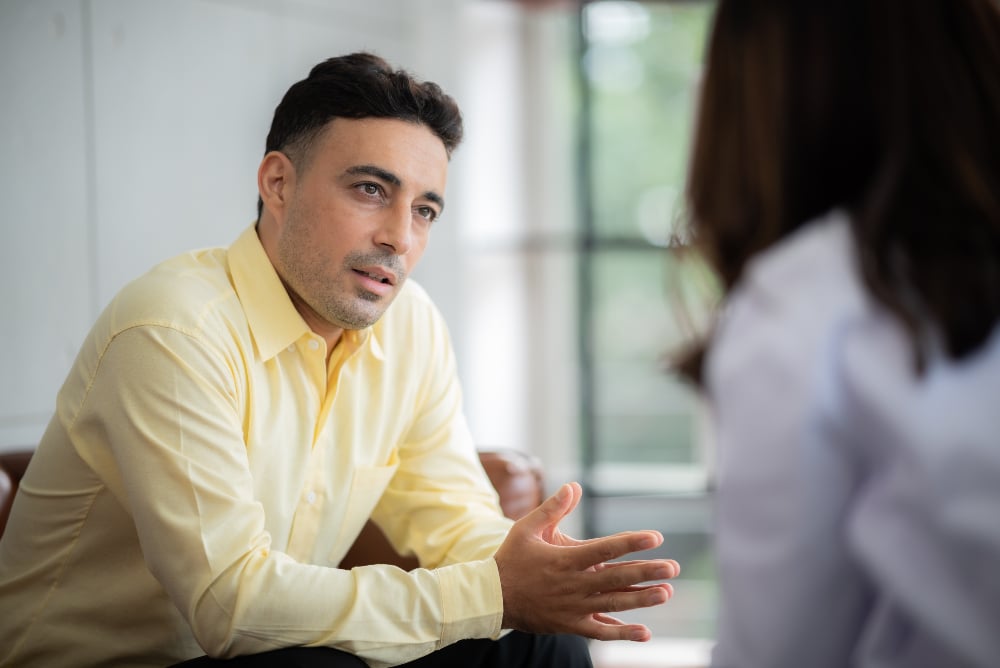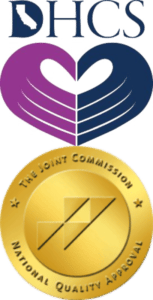Medically Reviewed by: Eric Chaghouri
The battle against drug addiction is often a silent one, waged in the hidden corners of society and the recesses of the human heart. When a loved one falls prey to this battle, our instincts scream for us to intervene, to pull them from the edge. However, the challenge intensifies when the person in question is blind to their predicament or refuses the hand extended to them. This guide is crafted to navigate these turbulent waters, offering a beacon of hope and a strategy for those feeling powerless in their desire to help.
Understanding Addiction
Addiction is a multifaceted demon, characterized not just by a physical dependency but by a psychological hold that can shatter willpower and distort reality. It’s crucial to recognize that addiction stems from a variety of sources, including trauma, mental health issues, and social pressures, making it a complex enemy to confront. The first step in aiding someone is understanding the nature of their battle, and recognizing the signs of addiction such as drastic changes in behavior, isolation, and physical deterioration.
Recognizing the Signs
Recognizing the signs of drug addiction is pivotal in understanding the scope of the problem and determining the best course of action to help. Addiction can manifest in various ways, both physically and behaviorally, making it important to be vigilant and informed.
Common physical signs include sudden weight loss or gain, unexplained bruises or marks, and changes in sleep patterns. Behavioral signs might be more subtle but are equally telling; these can include withdrawing from social activities, a loss of interest in hobbies or pursuits that were once enjoyed, deteriorating relationships with family and friends, and erratic or secretive behavior.
Financial difficulties are another red flag, as the need to sustain a drug habit often leads to unexplained borrowing of money, selling possessions, or theft. A decline in performance at work or school, frequent absenteeism, and a lack of motivation can also indicate substance abuse issues.
It’s essential to approach these signs with sensitivity, understanding that each individual’s situation is unique. Observation should be coupled with empathy, creating a foundation for supportive dialogue rather than confrontation.
The Challenges of Helping an Unwilling Addict
The journey of assisting an unwilling addict is fraught with obstacles that can test the resilience and patience of even the most determined helper. The core of these challenges often lies in the addict’s denial of their problem and resistance to change. This denial is not merely a refusal to see the truth but a complex defense mechanism that protects them from confronting the pain, guilt, and shame associated with their addiction.
Another significant challenge is the emotional toll on the person trying to offer help. Watching a loved one spiral into addiction can evoke feelings of frustration, anger, sadness, and helplessness. The fear of pushing the addict further away may lead to tiptoeing around the issue, while direct confrontation can result in defensive hostility or further withdrawal.
The balance between showing support and enabling the addict is delicate and difficult to maintain. It requires a deep understanding of addiction’s nature, a well of patience, and a thick skin to absorb the emotional backlash that efforts to help might provoke.
Denial and Resistance
Denial in addiction serves as a shield, protecting the individual from confronting the painful realities and consequences of their substance abuse. This denial is often compounded by resistance to change, rooted in fear, shame, and a profound sense of loss at the thought of giving up the substance. Such individuals might rationalize their drug use, dismiss concerns from loved ones, or compare themselves to others to minimize their own issues. Overcoming this resistance is a delicate process that requires patience, understanding, and strategic communication, recognizing that acknowledgment of the problem is the first step toward recovery.
Emotional and Psychological Barriers
Addiction seldom exists in isolation; it is often entangled with underlying emotional and psychological issues such as depression, anxiety, trauma, or unaddressed past abuses. These barriers make the journey to recovery more complex, as substance abuse is often a maladaptive coping mechanism for deeper pain. Addressing these emotional and psychological barriers requires a holistic approach to treatment, integrating psychological therapy and counseling to heal not just the addiction but the underlying wounds that fuel it.
Strategies for Offering Help
Communicating Effectively
Effective communication with an individual battling addiction is pivotal. It involves expressing concerns and feelings without judgment or blame. Utilizing “I” statements allows you to convey how their actions affect you, fostering a dialogue based on empathy rather than accusation. This method encourages openness and can help break down the defenses built by denial and shame. Listening actively and responding with understanding reinforces your support and concern for their well-being.
Setting Boundaries
Setting boundaries is essential for the well-being of both the individual struggling with addiction and their loved ones. These boundaries define what behaviors are acceptable and what consequences will follow if they are breached. It’s crucial to communicate these boundaries clearly and consistently, ensuring they are understood. While difficult, maintaining these boundaries is necessary to prevent enabling behavior and to encourage the individual to take responsibility for their actions. It’s a form of tough love that emphasizes care while upholding respect for oneself and the family unit.
Seeking Professional Help
Professional intervention can be a turning point in the battle against addiction. Addiction specialists, therapists, and rehabilitation programs provide the expertise, structure, and support necessary for effective treatment. These professionals can assess the individual’s specific needs, recommend appropriate treatments, and offer guidance on the road to recovery. Encouraging a loved one to seek professional help, while often challenging, is a critical step in helping them reclaim their life from addiction.
Alternative Approaches
When traditional methods of intervention face resistance, alternative approaches can provide new pathways to recovery. These might include holistic treatments, art or music therapy, equine therapy, yoga, Reiki therapy, or other non-conventional modalities that offer therapeutic benefits. Exploring these options can sometimes unlock a willingness to engage in the recovery process, particularly for individuals who have been resistant to more traditional forms of treatment.
Professional Intervention
At times, enlisting the aid of a professional interventionist can make a significant difference. These experts can guide you through the process of organizing an intervention, a critical step for many families. They understand the complexities of addictive behaviors and can help present a unified front that encourages your loved one to accept professional treatment.
Community Support
Recovery from addiction is not a journey that should be undertaken alone. Community support, whether from support groups like AA or NA, family, friends, or specialized community programs, can provide a network of understanding, encouragement, and accountability. These resources offer both the individual and their loved ones the communal strength and shared experiences to navigate the challenges of recovery.
Taking Care of Yourself
Supporting someone through addiction recovery is an emotionally taxing endeavor. It’s vital for caregivers and loved ones to prioritize their own well-being, recognizing that self-care is not selfish but necessary. Engaging in personal hobbies, seeking therapy or counseling, and joining support groups for families of addicts can provide the emotional sustenance required to continue offering support. Remember, taking care of yourself ensures you have the strength and resilience to be there for your loved one.
Treatment Options
When facing the challenge of helping a drug addict who doesn’t want help, understanding the array of treatment options available is crucial. This includes everything from inpatient and outpatient treatment facilities to specialized addiction treatment centers. Each option offers a different level of care, such as detox programs for those dealing with withdrawal symptoms, and long-term treatment programs like sober living homes designed to support sustained recovery.
LGBTQI+ Informed Drug Rehab Treatment
In the landscape of treatment options, it’s crucial to highlight the importance of LGBTQI+-informed drug rehab treatment. This specialized approach acknowledges the unique challenges and experiences faced by LGBTQI+ individuals in the context of substance use disorders. Recognizing that these individuals may encounter specific social pressures, mental health issues, and forms of discrimination that can exacerbate addiction, LGBTQI+-informed treatment centers provide a safe, supportive, and understanding environment that addresses these unique needs.
Developing a Comprehensive Treatment Plan
Working with health professionals to develop a treatment plan that addresses both the physical and psychological aspects of addiction is essential. A comprehensive plan will include a detailed approach to treatment, potentially incorporating family member involvement, outpatient or inpatient services, and a focus on long-term health care and emotional support.
Navigating Health Care and Insurance
Understanding the healthcare landscape, including insurance coverage, is a practical necessity when seeking treatment. Many treatment providers and facilities work with various insurance providers to cover the cost of drug addiction treatment. This can alleviate some of the financial stress and make it easier to focus on recovery.
Getting Help for Your Loved One
Helping a drug addict who doesn’t want help is a path fraught with challenges, but it is not without hope. Remember, the road to recovery is paved with patience, love, and the right support. Your efforts, even in the face of resistance, can be the beacon that guides your loved one back to shore.
If your loved one is struggling with a substance use disorder or drug addiction, get in touch with No Matter What Recovery. Our outpatient treatment facility in Los Angeles is dedicated to providing individuals in the LGBTQ+ community a safe environment to overcome the challenges of addiction.
FAQs
Start by ensuring they know you’re there for them, unconditionally. Educate yourself about addiction, and gently introduce the topic during moments of openness. Consider seeking professional advice on how to approach them effectively.
Focus on using “I” statements to express your feelings without blaming. Listen actively, acknowledge their feelings, and avoid confrontation. It’s about creating a safe space for them to open up.
Legal options vary by location and typically require the individual to pose a significant danger to themselves or others. It’s best to consult with a legal professional familiar with mental health and addiction laws in your area.
Understand that setting boundaries is an act of love and self-preservation, not punishment. Communicate your boundaries, explain why they’re necessary, and stick to them. Seeking support for yourself can also help manage feelings of guilt.
Look for support groups specifically for friends and families of addicts, such as Al-Anon or Nar-Anon. Counseling for yourself can also be incredibly beneficial. Remember, taking care of yourself is not selfish; it’s necessary.

Dr. Eric Chaghouri is our Medical Director at No Matter What Recovery. Since completing his forensic psychiatry fellowship, he has established a successful and thriving practice in Southern California, focusing on treatment of co-occurring psychiatric and addictive disorders.

Dr. Eric Chaghouri is our Medical Director at No Matter What Recovery. Since completing his forensic psychiatry fellowship, he has established a successful and thriving practice in Southern California, focusing on treatment of co-occurring psychiatric and addictive disorders.









